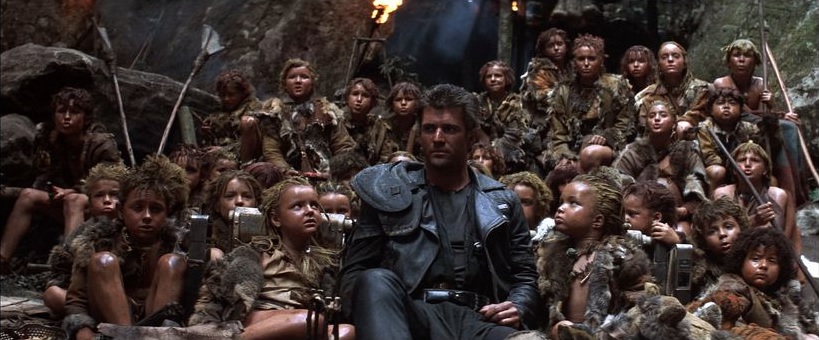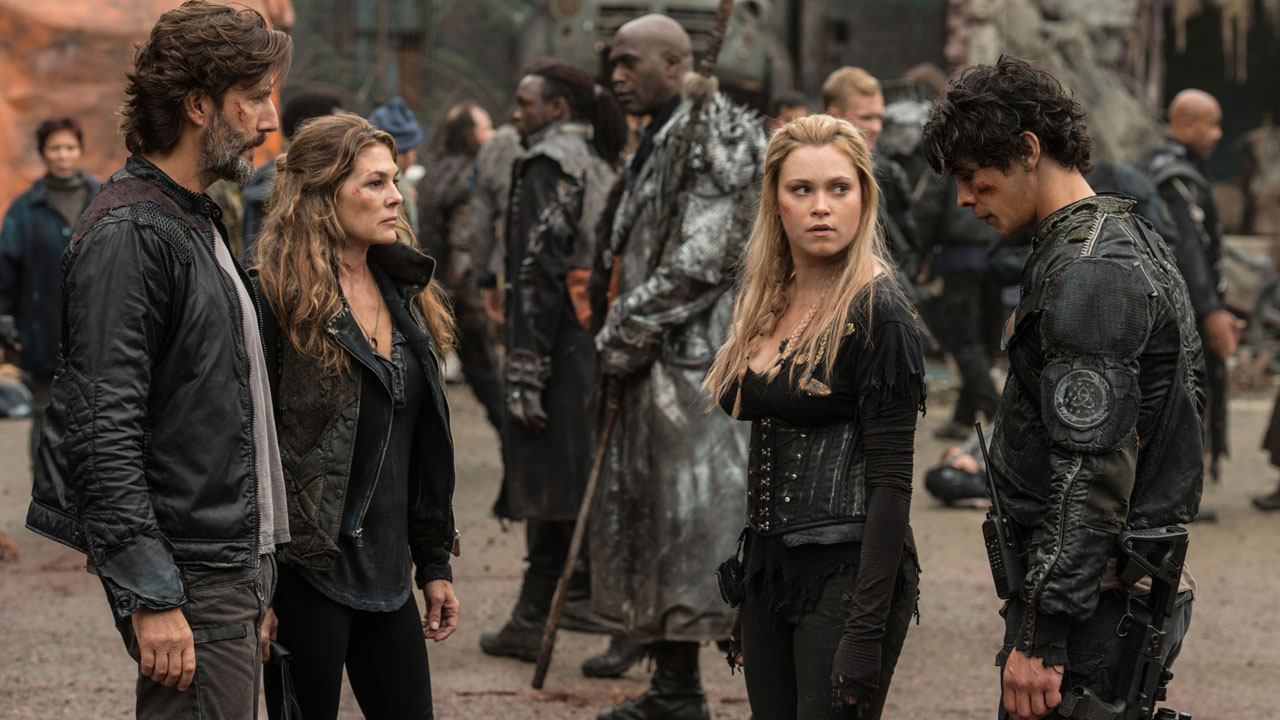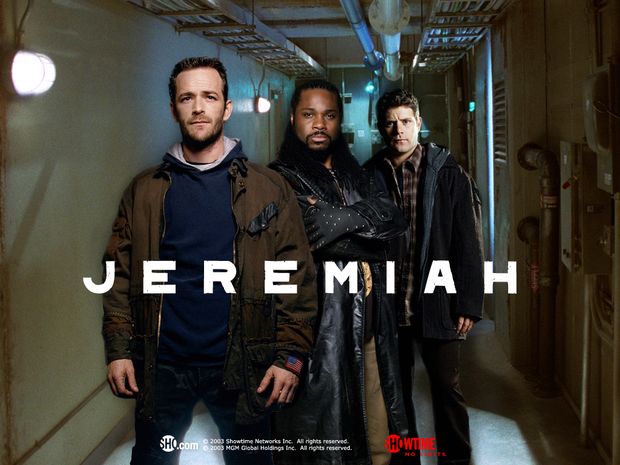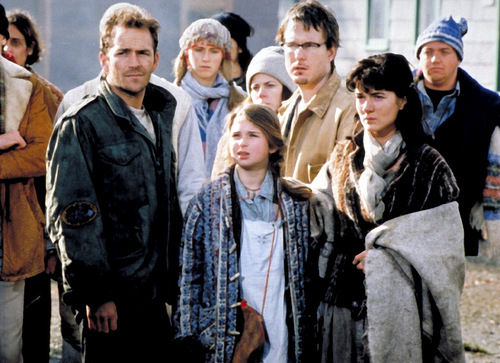Young people stepping up and taking charge of the world in the wake of an apocalyptic event is nothing new. The idea that almost every adult in the world could be killed off is vaguely acceptable, adults die all the time and a few of them probably even deserve it. But the children, the sweet and innocent children, surely at least a few of them must survive? Children are the most innocent form of humanity, still yet to be corrupted by the wider societies they’re born into, if anyone deserves to survive the end of the world it’s them. But focusing on young characters, especially after the world has ended, poses some unique challenges – primarily in terms of believability.
The real reason why teens don't lead the apocalypse well on TV. By @JJShurte via @PostApocalypt Share on XFrom Sandra Newman’s The Country of Ice Cream Star, to George Miller’s Mad Max Beyond Thunderdome, beyond William Golding’s Lord of the Flies and all the way back to J.M. Barrie’s Peter and Wendy – we’ve always been interested in how children and teens would develop as individuals, and as a collective society, if left to their own devices. How will the survive? Will they band together or tear each other apart? Will they be like us or will they become something wholly unique, and will this be better or worse than who we are now? All these questions are still relevant in the modern era, especially with children and young adults being some of the most ardent consumers of fictional content. Writers and directors know this as well, so it’s little wonder that they’re now catering directly to children and young adults.

The thing with childhood is that it’s a lot like the post apocalyptic period, it’s a temporary state of existence. The point being that children grow up, usually. Unless you’ve got a situation like in The Country of Ice Cream Star, where everyone dies around 20, or like in the Peter Pan series, where the Lost Boys simply never age, your cast of child characters are eventually going to hit puberty and turn into adults. At least by all logic they should. So why was there a tribe of feral kids in Mad Max Beyond Thunderdome? They hadn’t been there that long, we know that their parents crashed there in a plane and then went to go find help, so how and why did the children have this insanely primitive (and awesome) culture, with their own mythological narratives and devolved speech patterns? I’m cool with them being there, but… how?
Harry Potter is a lonely boy who discovers that he’s got magical powers and ends up saving the world, Bella Swan is a socially awkward young woman who discovers that the supernatural world is real and gets dragged into the centre of it. The Harry Potter and Twilight series are about secret and fantastical worlds that allow an escape from the drudgery of school and part time jobs, with characters just like the young readers/viewers at the heart of them. Personal preferences aside, at the very least Harry and Bella grew and evolved as their respective series progressed, they weren’t just perpetually stuck at the age they were when they were in their first stories. These characters knew how tough life can be when you’re growing up, they went through all the hardships that we all do as teenagers, but they also got to escape it all for adventure and romance – what teenager wouldn’t love that?

To bring the examples back to a more post apocalyptic bent – Charlotte Matheson, from Revolution, is a young woman who is at the forefront of a rebellion against an oppressive post-Blackout dictatorship. The 100 started off being about a bunch of (criminal) teenagers who were sent down to a radioactive Earth as test subjects, to see if the planet could once again sustain life. While in most stories children and young adults are relegated to second tier or even tertiary character status at best, post apocalyptic stories allow for them to hold the spotlight… often because the adults are somewhere else or they’re just straight up dead.
Imagine if you didn't have to decide your entire future as a teen and just got to focus on day-to-day survival. Share on XImagine if you didn’t have homework, or chores, and imagine if you didn’t have to decide your entire future as a teenager and instead you just got to focus on day to day survival. It’d be hard, of course, but there would be a lot less pressure and a certain kind of honesty to be found in it as well. And nothing *that* bad ever really happens to the protagonists of these stories, the really bad stuff only every happens to others in post apocalyptic fiction. Mind you, that’s clearly just Survivorship Bias, but we don’t need to go into that so just focus on the fact that the protagonist always survives! These stories target the imaginations of young viewers and readers and presents them with an excitingly dangerous, but ultimately safe ‘what if?’ scenario.

For the most part it works too, even if the pretext is a little contrived at times. It makes sense for Bellamy and Clarke to be in charge when there are no adults around in The 100. But why are they still in charge when the adults eventually, inevitably, show up? While it’d make more sense for the criminal teenagers to step into the background once the adults show up, the series is primarily about those teenagers and because of this they still have to be central to the action and making important decisions. I know it sounds like I’m unfairly ripping on The 100 here, but I actually really like the show despite it being teen-fiction. I’m simply dragging The 100 through the mud because it’s currently the most relevant series that tends to fall apart once the adults step back into the equation.
The thing is, there’s actually an old post apocalyptic series that found a pretty good reason for young people to be in charge.
Jeremiah aired from 2002 to 2004, with a total of 35 episodes. It’s based on this old school graphic novel series that has almost nothing in common with the TV series beyond the names of the two protagonists. I haven’t read any of them but the overall premise sounds kind of dicey so I can’t recommend you hunt them down. I can’t even recommend you watch the Jeremiah TV series, what with the amount of decent shows available these days, I only watched it so I could make the point for this article. Mind you, if you’ve literally got nothing better to do then feel free to check it out, it’s actually not that bad once you get into it. (You can watch it on Amazon here.)

Anyway, it’s the story about a man called Jeremiah, played by Luke Perry, and his friend Kurdy, played by Malcolm-Jamal Warner, as they wander a post apocalyptic United States trying to put the world back together. I don’t want to spoil too much, but fifteen years prior to the series starting there was an world ending event that was dubbed “the Big Death,” where anyone over the age of innocence was killed by a viral infection. Basically, if you’d hit puberty – you were dead. With this in mind, there’s a pretty logical reason as to why you’d rarely, if ever, see someone over the age of thirty in the series.
Now, this is technically a spoiler, but eventually it’s revealed that some adults managed to survive the Big Death. Sorry… total shock horror, I know. I’ll give you a moment to collect yourself. The point is, these adults have been so far removed from society for fifteen years that the world has moved on without them, and all these children have grown up and developed without their guidance. The adults have been gone for so long that it’s little surprise that when they do return, the old and the young clash.
The societies that the children made are largely violent and brutish, with the strong preying upon the weak, but there are also signs of co-operation and many of the better aspects of humanity that even the end of the world couldn’t kill. You get children who have imitated the old ways of things as best they could manage, for good or bad, while others have developed wholly new systems. What I took from all this is that humans will be humans, good and bad, regardless of the situation you put them in. Of course, with a protagonist called “Jeremiah” it should be fairly obvious that there’s some serious religious overtones to the series, but it actually kind of works here. Mostly.
Now, glossing over the fact that Luke Perry was 36 when they started filming this and he was playing someone who was meant to be in their mid to late twenties, the series is actually pretty good as a whole. It’s dated, obviously, but a lot of the acting and storylines are comparable to anything you’d see on television these days. It got a bit rushed at the end, when the producers knew that the series was cancelled, but a pretty good attempt was made to cram a fitting ending in. It’s just a strange coincidence that it’s probably set in 2017 and I just happen to be writing about it now, but overall 2002 was a strange time for television.
Watching it earlier this year it was strange to see the Hercules and Xena style action scenes that were common in the late 90’s, some hardcore depictions of racism that you couldn’t get away with these days and also the odd sex scene here and there that looked like it was pulled from Game of Thrones. Along with this, if you’ve watched any kind of science fiction television show that’s been aired over the past decade then you’re likely to see some familiar faces in Jeremiah. Seriously, go check out its IMDB cast page – everyone who is anyone was in this show for at least an episode.
Take notes from Jeremiah on how to best handle teens in post-apocalyptic dramas. Share on XI’m not saying that someone should remake Jeremiah (although someone totally should and I would absolutely be down for that) but people can at least take a few notes from it. A cast of young characters was warranted because it was written into the premise of the setting; all the adults were killed and only the children remained. They didn’t have to come up with reasons why teenagers were making continent shaping political decisions, they were making those decisions because there was absolutely nobody else who could. We got to see a massive cast of characters, mostly in their teens and twenties, who had largely grown up in a world without adults. Most of them had memories of the old world but they were largely shaped by the new world as they were shaping it.
If you want a cast of teens who still get to make important decisions, that's cool, just have a decent reason for it. Share on XIf you want to target children and young adults by having a cast of characters who are of a similar age, but who also still get to make important decisions, that’s cool, just have a decent reason as to why they’re doing it. If you’ve got swat teams and diplomats, each with decades of experience in their respective fields, then why are teenagers doing all the fighting and negotiating? I get that it needs to be that way in order to appeal to the core demographic, but at a certain point even the kids who are reading or watching these post apocalyptic narratives have to be thinking that the highly trained marines would be a safer bet than those kids from Red Dawn.
I’m fine with the Wolverines saving the day, just don’t have the leader of All-That-Remains-Of-Humanity pick them over a team of Navy SEALs… because that makes no fucking sense.
Like what you read? J.J. Shurte writes for us semi-regularly and you can see more of his articles on his blog here. Join our email list to stay updated by clicking here and be sure to follow us on Twitter.
And if you want to check out Jeremiah for yourself, you can watch it on Amazon here.


Leave a Reply